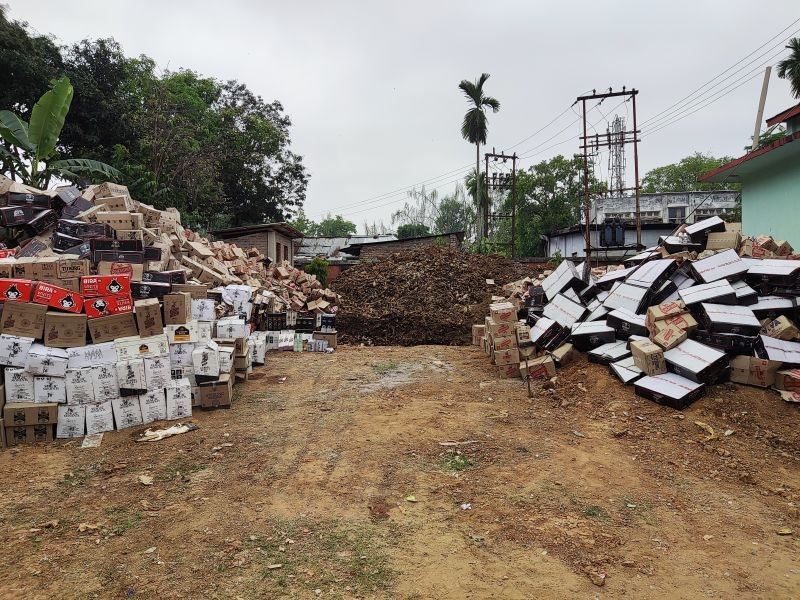Assorted Indian-Made Foreign Liquor (IMFL) seized by the Excise department are seen at the Excise Directorate Complex, Dimapur in this file photo taken April 7, 2022. Department officials said the IMFL worth around Rs 2.72 crore were destroyed afterwards. Such disposal of seized alcohol is a regular affair in ‘dry’ Nagaland. (Morung File Photo)

Imkong Walling
Dimapur | May 29
Consulting the civil society has become more the norm than the exception for the Nagaland state government. The same formula was applied to the contentious liquor Prohibition law, but how productive the consultations have been is anyone’s guess.
Three months back, on February 24, there was what was understood to be a consultative meeting with “stakeholders” on the Nagaland Liquor Total Prohibition (NLTP) Act. It was an invitation only meeting with 16 influential tribal, church and student organisations. Each organisation was asked to send three representatives to the meeting in Kohima.
Sobering of resistance?
In the meeting, held behind closed-doors, all the 16 organisations posted their views/proposals in writing, the contents of which were not disclosed. Only the Catholic Association of Nagaland (CAN) went public with its suggestions, in the form of a press release on March 2.
What transpired remained confidential, but sources, who attended, told The Morung Express on February 24, that a majority of the organisations were for reviewing the Prohibition law. This corroborated with the Advisor for Excise, Zhaleo Rio’s comment to the media, following the meeting, that “most had expressed their views” for revisiting the NLTP Act.
According to official excerpts of the meeting, Zhaleo’s statement tilted in favour of a review. In the meeting, he was quoted taking a stand that alcohol need not necessarily be viewed from the prism of religion and be left to personal choice. He said that viewing alcohol from a religious perspective alone would fail to address real world issues relating to health and economy. Considering the existing ground reality, the “stakeholders” were urged to provide frank suggestions.
The tone of the suggestions, submitted in writing by the stakeholders, indicated a sobering of erstwhile resistance with 13 out of the 16 organisations pointing to the failure of the NLTP Act as warranting appraisal.
“Failure, review, lift, revoke, restructure” were terms that popped up consistently.
Consensus on failure, not on way forward
The views posted can further be grouped broadly into 4 classes: one for doing away with the Act and framing a new regulatory regime, the second recommending either a total repeal or stringent enforcement, the third for giving the government the liberty to act and the fourth opposed any move for repealing and rather continuing with the Act.
The Naga Hoho (NH), Angami Public Organisation (APO), Angami Students’ Union (ASU), Zeliangrong Baudi (ZB), Naga Students’ Federation (NSF), Eastern Naga Students’ Federation (ENSF) and CAN, in essence, recommended a controlled liquor regime in place of total prohibition.
The suggestions posted by the NH, ZB and ASU were bound by a ‘doing more harm than good’ premise, with the ZB stating that the state of affairs warrants a “better alternative.” Coming to terms with the reality was what the NSF postured, while stating that the Naga people must accept that the Act has been a failure “as it is not applicable anymore and has not achieved the desired effect.”
According to the ENSF, Prohibition has only encouraged bootlegging and the Act should be lifted, while provisions should be made to review it from time to time.
The CAN called for reviewing the NLTP on the basis of “harm reduction.” The only organisation to have gone public with its proposal, it said that people will still find a way and the onus should rather be on reducing supply, demand and harm. It assured of continuing to support the plan and policies of the government and conscientising its members on responsible consumption.
The stand taken by the Central Nagaland Tribes Council, Central Nagaland Students’ Association and Dimapur Naga Students’ Union were either for revoking or strict implementation. The latter of the three pointed out the obvious failure of the Act, while stating that it has become redundant.
The Chakhesang Public Organisation, Eastern Nagaland People’s Organisation (ENPO) and Naga Mothers’ Association (NMA) held that the prerogative be given to the government. The NMA maintained that it was not in a position to agree to lift, yet it felt that the NLTP, which has loopholes, “can be revisited and reviewed.” “It is the State government's prerogative to ensure that it is also in the interest of its citizens and public,” it said. The ENPO said that it would support the government if the Act is to be lifted.
The Eastern Nagaland Women Organisation (ENWO), Nagaland Baptist Church Council and the Nagaland Joint Christian Forum supported the continuation of the Act. The ENWO stated that lifting the Act would have disastrous consequences.
(This concludes a three-part series on the NLTP Act)
Read part 1 of the series here:
https://www.morungexpress.com/when-the-ethereal-gets-caught-in-the-lab
Read part 2 of the series here:
http://www.morungexpress.com/nagaland-a-premeditated-move-to-examine-prohibition-law-shelved






